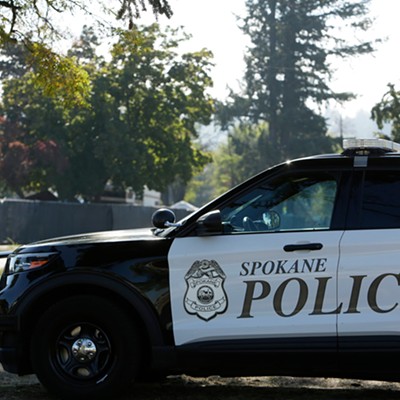On June 13, 2019, Spokane County Sheriff Ozzie Knezovich called a news conference to announce that he'd fired a sergeant for allegedly using a racist slur and sexually harassing a female deputy.
An internal affairs investigation, the sheriff said to reporters, had found that the sergeant had started a phone call to another deputy by saying: "You ready to kill some n——s tonight or what?"
The shocking comments had allegedly come from Sgt. Jeff Thurman, an 18-year veteran of the force. They were reported by former Deputy Andrew Richmond, who is Black. Richmond said he overheard Thurman use the slur to another deputy over a Bluetooth call.
Prior to the internal investigation, Thurman had been touted as one of the force's star employees. He'd worked with the department's K-9 unit and did community outreach with Laslo, an energetic German shepherd. Knezovich had twice awarded Thurman the "Sheriff's Star" — one of highest honors any sheriff's employee could receive.
But at the news conference, Knezovich described Thurman's comments as "reprehensible" — letting down the community, the agency and the profession as a whole. Knezovich described the whole thing as "the lowest point" in his 29 years in law enforcement.
Three years later, on Dec. 23, 2022, just days before Knezovich's retirement after 16 years as sheriff, a jury found that Thurman — who denies making the racist comment and filed the lawsuit shortly after losing his job — had been wrongly fired and defamed by the sheriff.
The Superior Court jury came to a verdict after less than a day of deliberation. Their ruling came with a steep price: $19.5 million.
Of the total payout, Thurman is getting $2.5 million for lost wages and $12 million for emotional damages. His wife, Kaycie Thurman, is receiving $5 million for emotional damages and loss of benefits her spouse's employment provided.
That's a huge sum of money, even in the context of other similar jury awards. In 2017, when the sheriff's office was sued over the death of a child hit by a speeding patrol car, the county settled for $1 million. In 2013, when a Spokane Valley pastor was shot during a confrontation with a deputy sheriff, the county settled for $2 million.
And this year's highly publicized defamation lawsuit that Johnny Depp filed against his ex-wife, Amber Heard, resulted in a $10 million jury award.
Mary Schultz, Thurman's lawyer, says it's her understanding that this will be the highest single jury plaintiffs' injury verdict ever in Spokane County. (The previous record appears to be a $14 million oral surgery malpractice suit in 2008, also won by Schultz.) Thurman's large award, Schultz says, shows the "egregious nature of what was done here."
The county is looking at appealing the verdict. If they're unsuccessful, the money will be paid out from the Washington Counties Risk Pool, which insures a number of Washington counties against litigation.
In his lawsuit, Thurman claimed that Knezovich had caused significant emotional distress by mischaracterizing the results of the internal investigation. Thurman also argued that he was the victim of reverse racial discrimination by the sheriff's office.
The history of the internal affairs investigation is messy. When Richmond first reported the alleged comments from Thurman, he thought it happened in 2018. Over the course of the investigation, the date changed to December 2016. The alleged comments were reported to internal affairs in May 2019.
When Sgt. Tim Hines, the investigator, asked about the comments, Tyler Kullman, the deputy on the other end of the call, said he couldn't say whether it happened or not, and that he didn't remember the specific incident.
When looking into the claim in 2019, Hines talked to two sergeants who said Richmond had told them about the incident and asked them to keep it quiet. During the investigation, a different deputy reported that she had heard Thurman use the racist epithet when he saw someone throw garbage out of a vehicle.
Hines also interviewed a female deputy, who said Thurman had made some comments about sharing a hotel room with her that were sexual in nature.
When interviewed by Hines, Thurman said he didn't recall making the statement about killing Black people. When pressed by the investigator on the difference between "I don't recall" and "I didn't make the statement," Thurman didn't directly answer the question, and brought up his past problems blacking out because of alcohol.
"So, could there have been a time I talked to him and said some shit? Maybe. I don't know. But, I can honestly say I 100 percent do not recall making that statement," Thurman said in the interview.
Thurman had the same "do not recall" response when asked about the incident with the man throwing garbage out of his car. Thurman acknowledged that he had made the hotel room comment to the female deputy, but said it was a joke taken out of context, and that the female deputy didn't seem offended and understood he was joking. (She told Hines she thought Thurman was joking.)
Multiple deputies told investigators that they had heard Thurman use the racial epithet before. Thurman, in a written response to the allegations, acknowledged using the slur before, but claimed it was always in sarcasm or as a joke, and never to a Black person in a racist or biased way.
Richmond would later leave the sheriff's office and file a lawsuit of his own against the department, claiming he was retaliated against. His lawsuit, which is still in federal court, opens with references to the "thin blue line" and claims Richmond was subjected to a hostile work environment because of his allegations. His lawyer couldn't be reached for comment.
The two lawsuits put the lawyers representing Spokane County in a tricky situation. In the Thurman lawsuit, they had to defend Richmond's credibility and argue that his story about Thurman's use of the slur was accurate. But in the retaliation lawsuit, the county's lawyers have to argue that Richmond was incorrect, that his claims of retaliation are misguided.
Schultz has argued that the evidence outlined in the internal investigation was flimsy and full of holes, and that the sheriff was aware of that when he held his press conference. She frames Knezovich's June 2019 news conference as a stunt — an attention grab that the sheriff knew would draw national media attention.
"The sheriff knew that he was permanently nationally harming me at that conference," Thurman wrote in his declaration to the court.
In court documents, Schultz questioned Richmond's credibility, pointing to inconsistencies in timelines and the fact that the patrol car where the call allegedly took place wasn't equipped with Bluetooth at the time. She argues that Richmond told investigators that "many people" had warned him that Thurman was a racist, but was only able to provide the name of one person.
In his declaration, Thurman also provided chat messages that show Richmond using racially insensitive jokes. He questions why Knezovich didn't discipline Richmond for that. He also notes that the female deputy didn't think his comments rose to the level of sexual harassment. (In a deposition, Knezovich argued that offensive statements can still be considered sexual harassment even if the other party doesn't see it that way.)
Citing the ongoing legal process and possibility of an appeal, the various lawyers involved in Thurman's and Richmond's lawsuits are hesitant to go into details about the court proceedings.
Michael Kitson, a Seattle-based lawyer representing Spokane County, says the legal team was disappointed and admittedly surprised by the outcome of the Thurman trial. He declined to comment on how or if the verdict in the Thurman case might affect Richmond's lawsuit against the county, which is set for a September trial.
Even Knezovich, famously talkative, declined to be interviewed on the record. In an emailed statement, he said his legal team is working on an appeal. "While I respect the jury's work on this issue I respectfully disagree with the verdict," he wrote.
Schultz says Thurman is working towards healing himself and his family. He wishes he could still be in a patrol car, she says, but knows the media coverage of Knezovich's 2019 press conference makes that impossible.
In an emailed statement, Schultz writes: "As one deputy testified at trial, our community is less safe without Mr. Thurman on patrol, and in spite of the damage award, the damage to the community will remain." ♦
























